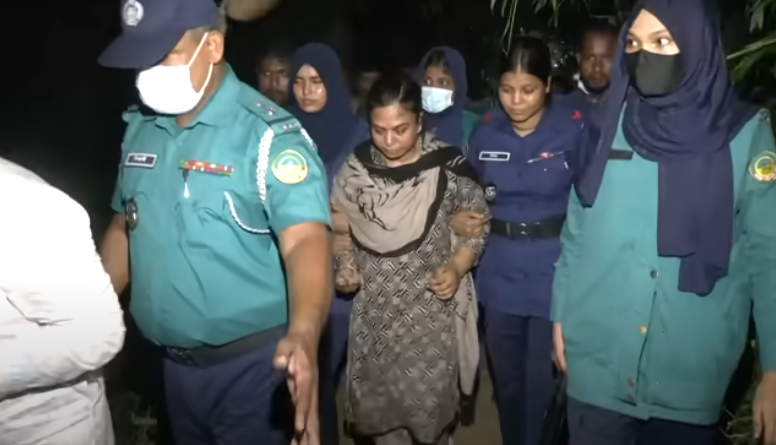OPINION: Bangladesh’s Shame—How Journo Rupa Was Denied Her Mother’s Last Breath
If the international community allows these narratives to disappear in silence, it becomes complicit in its own oppression, it claims to abhor.
Four hours. Seriously? That’s what justice boils down to now in Bangladesh? Just four measly hours of parole for Farzana Rupa and Shakil Ahmed. Dragged through handcuff by malicious charges and failed to say goodbye to a dying mom they hadn’t met in almost a year.
Did they have adequate time for travel, attending the funeral, and returning to jail? Did anyone even stop to think what a single hour with her mom meant to Rupa?
Her mother spent her last days begging for her daughter’s release, but sure, let’s pretend that’s not the headline in Bangladesh.
Did anyone in power spare a thought for the wreckage left behind? Punishing a Professional journalist on murder charges she had no stake on. Not just playing with her career, her family, her honour and the life of her recently deceased mother. Who will take responsibility for the death of her mother?
A heartbreaking conversation with Rupa’s friend
Ms. Charlotte Jacquemart, a respected Swiss journalist, criticized the ongoing detention of Bangladeshi journalists Farzana Rupa and Shakil Ahmed. Her statements are direct and deeply personal, underscoring what she describes as a tragic situation impacting not only the journalists but also their families and professional circles.
Both Rupa and Ahmed have been incarcerated for ten months. During this period, they have not been granted access to proper legal representation. Jacquemart, who has a close professional and personal relationship with Farzana Rupa, noted that multiple requests for bail have been denied, even as Rupa’s mother’s health deteriorated. The lack of release prevented Rupa from providing care or support during this critical time her mother needed.
The consequences of their detention extend beyond the prison walls. Their families, particularly minor children, are left without financial or emotional support. Jacquemart highlighted that the absence of adequate medical treatment for Rupa’s mother—stemming from the journalists’ inability to intervene—ultimately resulted in a tragic loss, as confirmed by medical professionals.
On one occasion, authorities allowed the journalists four hours of parole to visit Rupa’s dying mother. However, logistical process meant three hours were spent in travel by prison van, leaving just one hour to see her mother’s dead body.
Jacquemart asserts that the case violates both international human rights standards and Bangladeshi constitutional guarantees, specifically regarding press freedom. She also criticized the Bangladeshi Interim leadership of Noble Laureate Yunus, alleging a targeted campaign against critics—including journalists, lawyers, activists, and minorities—while convicted criminals and terrorists are released.
In her concluding remarks, Jacquemart called on Western governments to reconsider their support for the current Bangladeshi administration, suggesting that the leadership prioritizes personal power and targeted retribution over the welfare of the Bangladeshi people or adherence to democratic principles.
Why was Rupa arrested?
Farzana Rupa’s professional trajectory was anything but ordinary—she made a name for herself by tackling high-stakes, controversial topics head-on. As principal correspondent and anchor at Ekattor TV, she played a pivotal role in shaping coverage of major political controversies and social issues in Bangladesh. Her leadership extended to hosting critical debates and shedding light on human rights abuses, which inevitably attracted both public attention and, regrettably, threats from more radical groups.
Her investigative work on cases like the Pohela Boishakh sexual assaults and interviews with polarizing figures such as Taslima Nasreen garnered international recognition. This visibility, while elevating her professional profile, also exposed her to significant personal risk. Rupa was known for open support for Prime Minister in exile Sheikh Hasina during the turbulent July protests of 2024, coupled with her readiness to challenge those in power, placed her squarely in the spotlight following the change in government.
Subsequently, both she and her husband faced arrest, charged with incitement to murder, and were held without bail. Many Political observers interpret these developments as part of a broader, politically driven effort to suppress independent journalism in Bangladesh.
Rupa’s tears to the UN
Farzana Rupa made urgent appeals to the United Nations while she was detained, but, frankly, there was no timely intervention. Her family paid the price. Her mother had passed away. Will the UN acknowledge any responsibility for a loss that perhaps could have been avoided? Given that Rupa couldn’t be present, advocate for medical care, or even offer basic comfort, one must wonder about the effectiveness of these international mechanisms.
The situation raises a larger issue: will this tragedy prompt any real reflection or policy change, or will it simply fade from attention, with Rupa’s unanswered appeals lost in the noise? The lack of response speaks volumes about the current state of international accountability.
A cruel crossroad in Bangladesh
The narratives around Rupa and Ahmed highlight a deep crisis in Bangladesh – a powerful mix of political alienation and human rights degradation. Individuals become collateral damage to state strategies to nullify dissent; Their bodies and psyche serve as dark reminders of the severe cost of Journalism in an increasingly authoritarian means. Government tactics, remnants of authoritarian regimes around the world, show a worrying model of governance based on the oppression.
Farzana Rupa and Shakil Ahmed are like symbols. They are faces that marked a scenario of overwhelming darkness. They force us to examine not only their unfortunate circumstances, but to confront the systemic injustices that permeate Bangladesh’s political scenario. Their stories are a call of duty to global citizens, reminding them that true democracy cannot exist when dissent is criminalized.
If the international community allows these narratives to disappear in silence, it becomes complicit in its own oppression, it claims to abhor. A collective awakening for twin tragedies, though deeply personal, illuminates a much greater evil: the erosion of human dignity by another Noble laureate.
Disclaimer: Views expressed by writers in this section are their own and do not reflect Milli Chronicle’s point-of-view.



